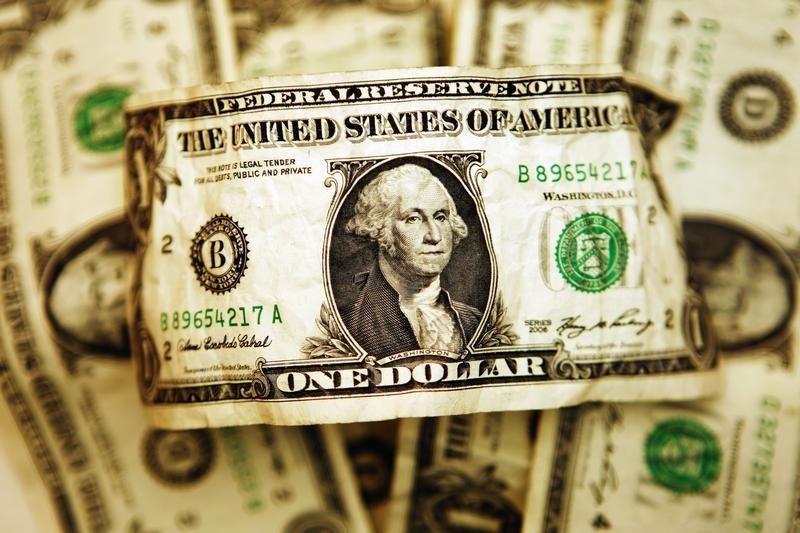(New throughout; changes dateline, previous LONDON)
By Kate Duguid
NEW YORK, June 18 (Reuters) - The U.S. dollar and Japanese
yen strengthened on Thursday as concerns about a rise in new
coronavirus cases underpinned demand for safe-haven currencies.
An index tracking the dollar against a basket of currencies
=USD was up 0.20% in New York morning trade to 97.267. The
dollar has strengthened in recent weeks as investors grappled
with fears about the COVID-19 pandemic's impact on economic
growth. The Japanese yen was last 0.32% stronger at 106.66
JPY= , the highest since June 12, and close to the one-month
high of 106.58 it rose to last week.
High-quality assets gained as risk assets like U.S. assets
fell.
"If the stock market has one major vulnerability right now,
it's the dreaded second wave of the virus, which threatens to
shut down economies once more. It's all well and good central
banks pumping the system full of cash, if the global economy
grinds to a halt again, investors will get very nervous," said
Craig Erlam, senior market analyst at Oanda.
More than 8.36 million people have been reported to be
infected by the novel coronavirus globally and 447,985 have
died, a Reuters tally found. A surge in new coronavirus infections in several U.S. states
and the imposition of travel curbs in Beijing to stop a new
outbreak there have served as a reminder of the risks of
reopening economic activity before a vaccine has been developed.
Also driving the demand for safe-haven assets on Thursday
was U.S. data showing that a recovery in the labor market has
plateaued.
The number of Americans filing for unemployment benefits
fell last week, but the pace of decline appears to have stalled
amid a second wave of layoffs as companies battle weak demand
and fractured supply chains, supporting views that the economy
faces a long and difficult recovery from the COVID-19 recession.
The euro was last 0.16% weaker against the greenback, at
$1.122 EUR= . The common currency has lost nearly 1% of its
value in less than a week as investors questioned whether the
European Union would be able to pass an ambitious stimulus plan
proposed by the European Commission, given that some countries
are opposed to handing out aid as grants.
- English (USA)
- English (UK)
- English (India)
- English (Canada)
- English (Australia)
- English (South Africa)
- English (Philippines)
- Deutsch
- Español (España)
- Español (México)
- Français
- Italiano
- Nederlands
- Português (Portugal)
- Polski
- Português (Brasil)
- Русский
- Türkçe
- العربية
- Ελληνικά
- Svenska
- Suomi
- עברית
- 日本語
- 한국어
- 简体中文
- 繁體中文
- Bahasa Indonesia
- Bahasa Melayu
- ไทย
- Tiếng Việt
- हिंदी
FOREX-Safe-havens dollar, yen supported by fears of new pandemic wave
Published 18/06/2020, 16:34
FOREX-Safe-havens dollar, yen supported by fears of new pandemic wave

Latest comments
Install Our App
Risk Disclosure: Trading in financial instruments and/or cryptocurrencies involves high risks including the risk of losing some, or all, of your investment amount, and may not be suitable for all investors. Prices of cryptocurrencies are extremely volatile and may be affected by external factors such as financial, regulatory or political events. Trading on margin increases the financial risks.
Before deciding to trade in financial instrument or cryptocurrencies you should be fully informed of the risks and costs associated with trading the financial markets, carefully consider your investment objectives, level of experience, and risk appetite, and seek professional advice where needed.
Fusion Media would like to remind you that the data contained in this website is not necessarily real-time nor accurate. The data and prices on the website are not necessarily provided by any market or exchange, but may be provided by market makers, and so prices may not be accurate and may differ from the actual price at any given market, meaning prices are indicative and not appropriate for trading purposes. Fusion Media and any provider of the data contained in this website will not accept liability for any loss or damage as a result of your trading, or your reliance on the information contained within this website.
It is prohibited to use, store, reproduce, display, modify, transmit or distribute the data contained in this website without the explicit prior written permission of Fusion Media and/or the data provider. All intellectual property rights are reserved by the providers and/or the exchange providing the data contained in this website.
Fusion Media may be compensated by the advertisers that appear on the website, based on your interaction with the advertisements or advertisers
Before deciding to trade in financial instrument or cryptocurrencies you should be fully informed of the risks and costs associated with trading the financial markets, carefully consider your investment objectives, level of experience, and risk appetite, and seek professional advice where needed.
Fusion Media would like to remind you that the data contained in this website is not necessarily real-time nor accurate. The data and prices on the website are not necessarily provided by any market or exchange, but may be provided by market makers, and so prices may not be accurate and may differ from the actual price at any given market, meaning prices are indicative and not appropriate for trading purposes. Fusion Media and any provider of the data contained in this website will not accept liability for any loss or damage as a result of your trading, or your reliance on the information contained within this website.
It is prohibited to use, store, reproduce, display, modify, transmit or distribute the data contained in this website without the explicit prior written permission of Fusion Media and/or the data provider. All intellectual property rights are reserved by the providers and/or the exchange providing the data contained in this website.
Fusion Media may be compensated by the advertisers that appear on the website, based on your interaction with the advertisements or advertisers
© 2007-2024 - Fusion Media Limited. All Rights Reserved.